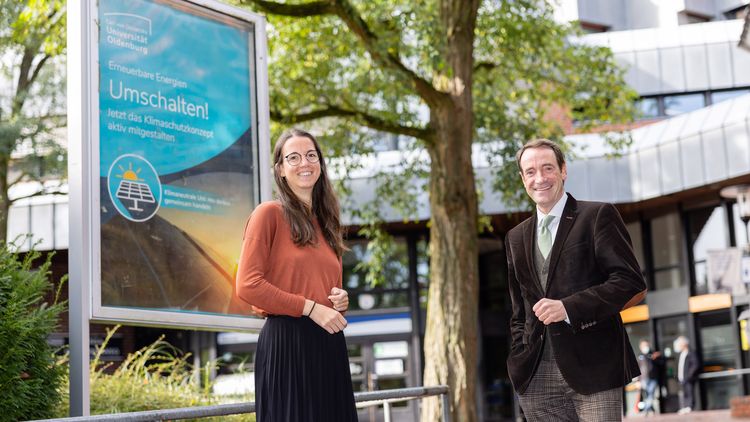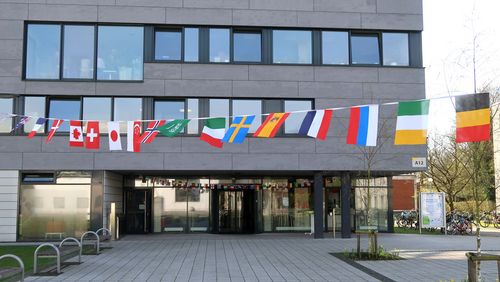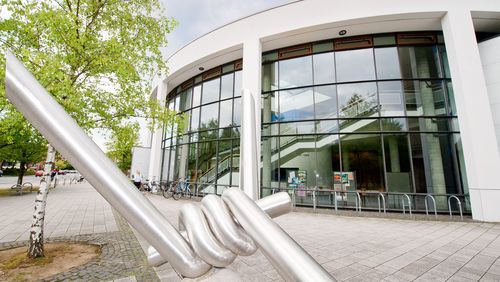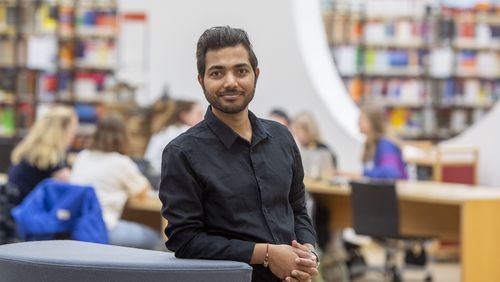The university is on its way to climate neutrality. Today, the project group presented the plan at an online event. Climate protection manager Anna Sarah Krämer is counting on the participation of all university members.
How well are certain university buildings insulated? How many windows does the Student Service Centre have? And what about the roof of the bridge building that connects two major building blocks on the Haarentor campus? A group of three inspected the buildings on the campus in October this year. Anna Sarah Krämer, 26, the university's climate protection manager since April, was among them. She is in charge of a project that will run for years: the climate-neutral university.
"We are currently taking stock: what did the greenhouse gas and energy balances look like in 2019 and 2020? We have figures from before and in the middle of the pandemic. From this, we want to determine what could realistically be done in the future," reports the sustainability economist. Because of the covid-19 pandemic, working from home increased as well as digital teaching. Thus, the energy consumption and the CO2 emissions of the university also changed last year.
How can the university position itself more sustainably?
In addition to the energy use by the buildings, other parameters are included in the balance: mobility, in the form of business trips or commuting, university catering and the CO2 footprint of equipment purchased by the university. By February, the external service provider, an engineering consultant from Varel, will calculate the potential for savings and develop scenarios for how the university could position itself more sustainably.
"I'm really excited to see the results and learn about when we can be climate neutral," says Krämer. One target could be the year 2030, which many other universities are also aiming for. In addition to Oldenburg, the Humboldt Universität Berlin and the universities of Freiburg and Göttingen, for example, are currently working on the vision of climate neutrality. The University Lüneburg is already officially considered climate neutral. Krämer sees 2035 as the latest date - the year in which the city of Oldenburg wants to be climate neutral. "In any case, we don't have much time left," she sums up.
Concrete measures to be presented by the end of 2022
The ambitious plan has been in place since 2020, when the student council submitted a motion to the university’s senate to strive for climate neutrality. After the decision was made, a working group was founded in which the administration, presidential board, teaching staff and students are represented. Since then, it has met once a month. The economist Prof. Dr. Bernd Siebenhüner heads the project.
In his view, the university is already doing quite well in a nationwide comparison: photovoltaic systems have been installed where possible, there has been a sustainability report every three years since 2013 and numerous degree programmes deal with the topic of sustainability. "We are good in the energy sector, but we can still improve in mobility and especially in the procurement of equipment," he points out. For Siebenhüner, it comes down to bringing technical measures and behavioural changes together. "And we have to be careful not to get out of breath after the first actions," he emphasises.
Cooperation with the City of Oldenburg is important
The current project, and with it Krämer's job at COAST, the Centre for Environmental and Sustainability Research, is funded by the German Federal Ministry for the Environment. Her task is to present an integrated climate protection concept with concrete measures to reduce emissions by December 2022. That will be the centrepiece of her work, she says.
The 26-year-old has many ideas: Could employees make shorter business trips by train? Could cycling be made even more attractive? Refurbishing buildings or providing energy through heat pumps would also be a big step. For Siebenhüner, cooperation with the City of Oldenburg is an important point: "We have to coordinate well, for example in mobility." The university wants to be a pioneer in Oldenburg and show how climate neutrality can be implemented.
Getting everyone onboard
In order to achieve the ambitious goal as soon as possible, Krämer calls on all university members to participate with suggestions and their own actions. In the coming summer semester, there will be workshops and online tutorials. Krämer also plans to publish a regular newsletter.
To get everyone onboard, the university’s president, Prof. Dr Ralph Bruder, the city's climate protection manager, members of the AStA also joined today’s kick-off event. "The best ideas are useless if they are not communicated," Krämer says. This is the only way to implement measures at the university that will have a long-term effect. A marathon, after all. But at the finish line you are usually very happy and proud.






